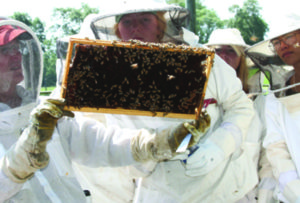
If you ask Jill Isenbarger, CEO of Stone Barns Center, she”™ll tell you that our food system is in trouble.
“We”™ve moved away from strong relationships with farms and farmers and let the food system become dominated by industrial-scale interests, so we have lost touch with those who care for soil and can help us choose the foods that are good for us and the environment,” Isenbarger said. “It”™s going to take a broad set of global citizens to really drive change in the food system over the next 50 years.”
For Isenbarger, that change will start with one specific group of people.
“There is no more important group to engage with than high schoolers,” she said. “The more people we have who are excited about this topic, the better we are.”
To help engage those students, the farm and education center has launched a High School Summer Institute, an immersive, food-focused educational program held on its 80-acre farm in Pocantico Hills.
This two-week course for high school juniors and seniors aims to transform students into “food citizens” through explorations of the farm, cooking labs and discussions.
“In the beginning of the course, we get students to think deeply about the fact that food is one of the building blocks of our culture and one of binding elements of our society,” she said. “They come to those conclusions and are able to unearth those ideas on their own through conversation.”
During the course, students explore a variety of topics, from food culture to food and the environment. Other topics include the “good food movement” and sustainable farming practices, like beekeeping or management of the food waste stream.
“We really break the challenges of the food system down into kind of individual stories,” she said.
Now in its second year, the program stems from the organization”™s work with area schools. Stone Barns officials began teaching semester-long courses at schools in New York City four years ago, classes that aimed to “get students thinking about food.”
As the curriculum for those courses developed, the organization began exploring a new idea. Instead of bringing certain aspects of the farm to the students, they aimed to bring the students to the farm.
 “The camp creates an even deeper emotional connection that”™s harder to create in a classroom,” Isenbarger said. “It gives you a week where every day, you”™re directly connecting what”™s in the soil to what”™s on your plate.”
“The camp creates an even deeper emotional connection that”™s harder to create in a classroom,” Isenbarger said. “It gives you a week where every day, you”™re directly connecting what”™s in the soil to what”™s on your plate.”
For example, students could spend a morning outside harvesting vegetables that would later be used to create a healthy meal for their lunches.
“Just being able to make that direct connection is really invaluable to the way we think about the how the choices of what we eat have an impact. There”™s no replacement to seeing that in real life.”
Along with educating students about their food, the courses also aim to connect students with those who grow it.
“They get to interact with the farmers in a very intense way,” Isenbarger said. “It”™s important they have that human connection, that recognition of how hard someone works to grow your food and how skilled they are and all the different kinds of knowledge they need to do that successfully.”
Students come to the program from a range of backgrounds and with an array of interests. Some hope to work in agriculture or a related field, others hope to embark on a career in the restaurant industry. Others are particularly interested in environmental conservation or other social issues.
“One of the things I really love about them is they”™re not passive environmentalists,” she said. “They might be less inclined to join the Sierra Club, but they really want to put their hands in the dirt.”
Most of the students who attend the program are from Westchester, though some travel to the farm from New York City.
“There is no such thing as our ideal student,” she said. “We want a real cross-section. Fixing the food system is going to take professionals from all kinds of disciplines.”
High schoolers are the perfect age for this program, Isenbarger said, because they”™re just on the cusp of adulthood.
“They”™re making their own choices,” she said. “They”™re going to become global citizens who care about a variety of issues, and we want food to be one of those issues.”
The institute will run two weekday sessions this summer, with prices ranging from $1,357 for members of Stone Barns to $1,675 for nonmembers. Scholarships are available for students who qualify for free or reduced-price school lunch.
“We want the classes to be accessible to everyone, to anyone who is excited and enthusiastic and willing to do the work and participate,” she said.
Isenbarger said there is “definitely a demand” for courses like the ones Stone Barns offers.
“I think it”™s fair to say that there”™s a greater awareness and more savviness among students about food,” she said. “And there are kids who think it”™s cool.”






















